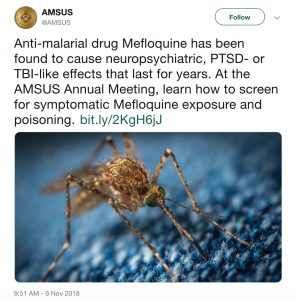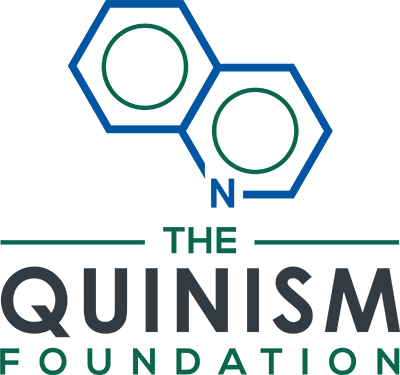Roche Abandons Lariam Property Rights
 The Quinism Foundation is pleased to learn that Roche, the original manufacturer of mefloquine, has quietly sold its property rights to its branded version of the drug, Lariam, in several jurisdictions, including to the German pharmaceutical company, Chephalapharm, and to the Australian pharmaceutical company Pharmaco. With this transfer, Chephalapharm now becomes the exclusive marketer of Lariam in neighboring Austria, while Pharmaco becomes the exclusive marketer of Lariam in Australia — a jurisdiction where the use of mefloquine has come under intense scrutiny as part of recent Australian Senate committee hearings.
The Quinism Foundation is pleased to learn that Roche, the original manufacturer of mefloquine, has quietly sold its property rights to its branded version of the drug, Lariam, in several jurisdictions, including to the German pharmaceutical company, Chephalapharm, and to the Australian pharmaceutical company Pharmaco. With this transfer, Chephalapharm now becomes the exclusive marketer of Lariam in neighboring Austria, while Pharmaco becomes the exclusive marketer of Lariam in Australia — a jurisdiction where the use of mefloquine has come under intense scrutiny as part of recent Australian Senate committee hearings.
Despite this recent transfer, Roche remains listed on the marketing materials for Lariam in several jurisdictions, including the U.K., France, and New Zealand. Whether these jurisdictions will see rights to Lariam similarly transferred to other pharmaceutical companies is unclear. However, indications appear to suggest that Roche is quietly abandoning the drug worldwide. Previously, Roche had discontinued marketing Lariam-branded mefloquine in several jurisdictions, including Ireland, where over a hundred former and serving soldiers are suing the Irish state for Lariam-related damages, and Germany, where the drug was recently banned from German military use.
Several years prior to these recent transfers, Roche had requested a withdrawal of marketing authorization for Lariam in several jurisdictions, including the United States and Canada — meaning that any future deals to transfer property rights are unlikely to see Lariam-branded mefloquine return to these jurisdictions, in which generic versions of mefloquine remain available.
Despite the apparent decline in the commercial viability of mefloquine for malaria prophylaxis, mefloquine continues to be of interest to pharmaceutical companies, including as a repurposed drug for other indications. As described in this press release, the Quinism Foundation recently sent correspondence to Theranexus, a Paris-based company investigating use of mefloquine in combination with various drugs, including donepezil for treatment of neurocognitive disorders in Alzheimer’s disease, expressing its concerns with the clinical testing of this compound, known as THN201.
Mefloquine and the Peace Corps
 The Peace Corps’ questionable use of mefloquine is the subject of renewed media interest, with WUSA9’s recent airing of a five-minute investigative report by reporter Andrea McCarren, featuring an interview with Peace Corps Director of Epidemiology, Dr. Kyle Petersen, in which he gives awkward and tone-deaf responses to questions on the drug’s continued use.
The Peace Corps’ questionable use of mefloquine is the subject of renewed media interest, with WUSA9’s recent airing of a five-minute investigative report by reporter Andrea McCarren, featuring an interview with Peace Corps Director of Epidemiology, Dr. Kyle Petersen, in which he gives awkward and tone-deaf responses to questions on the drug’s continued use.
As described in this press release, The Quinism Foundation has previously called upon NPR to air its own completed investigative report into the Peace Corps’ use of mefloquine, which was cancelled only days before it was scheduled to air.
Both executive director Dr. Nevin and board member Dr. Ritchie have previously written to the Director of the Peace Corps, requesting much-needed improvements in Peace Corps mefloquine policy. Unfortunately, to date, no response has been received from the Peace Corps related to this correspondence. In the coming months, The Quinism Foundation will following up on the troubling lack of attention paid by the Peace Corps to these concerns.If you are a Returned Peace Corps Volunteer, and can attest to being administered off-label loading doses of mefloquine, or were advised to continue use of the drug despite reporting the onset of psychiatric symptoms, or are today suffering what you believe are chronic adverse effects from your use of the drug, we want to hear from you. Please contact us to share your story confidentially.
Visit Our New Website!
 The Quinism Foundation is very proud to announce its new and expanded website is now live at quinism.org. Our new website features archives of past press releases and newsletters, and an expanded section describing the foundation and featuring photographs from our home in beautiful White River Junction, Vermont. In the coming months, the website will begin to feature additional content, including resources for clinicians, researchers, and patients. Please visit often to stay informed, and encourage others to visit the site!
The Quinism Foundation is very proud to announce its new and expanded website is now live at quinism.org. Our new website features archives of past press releases and newsletters, and an expanded section describing the foundation and featuring photographs from our home in beautiful White River Junction, Vermont. In the coming months, the website will begin to feature additional content, including resources for clinicians, researchers, and patients. Please visit often to stay informed, and encourage others to visit the site!
The foundation is grateful to Ryan Masterson, co-founder of Green Hat Web Solutions, for leading the redesign. Ryan has himself been affected by quinism chronically for 20 years, and has a strong interest in supporting the foundation, donating some of his time to help in the redesign. Ryan is also offering a discount to other recipients of this email list. His company can offer website development, design and SEO/marketing services.
Fundraising Update
One month into our campaign, and with just over two weeks left to go, we are now 2/3 of the way to reaching our fundraising goal to support our educational talk at the 2018 Annual Meeting of the Association of Military Surgeons of the United States (AMSUS). We are delighted that AMSUS has been showing strong support for our upcoming talk by promoting it extensively, including in tweets on Twitter. As a result, we expect this 50-minute talk will be very well attended by DoD and VA clinicians.
 Please support this effort by donating today — the clinician that attends this talk may be your own!
Please support this effort by donating today — the clinician that attends this talk may be your own!
The foundation is proud to be listed as a registered charity in the PayPal Giving Fund, on Amazon Smile, and in the Network for Good’s donor-advised fund. You can also read more about the foundation’s charitable activities by reviewing our listing on Guidestar.

